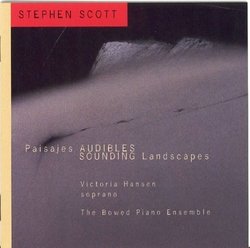| All Artists: Stephen Scott, Bowed Piano Ensemble, Victoria Hansen Title: Paisajes Audibles (Sounding Landscapes) Members Wishing: 0 Total Copies: 0 Label: Albany Records Release Date: 5/25/2004 Genres: Jazz, Pop, Classical Styles: Modern Postbebop, Bebop, Vocal Pop, Chamber Music, Historical Periods, Classical (c.1770-1830), Modern, 20th, & 21st Century, Instruments, Electronic Number of Discs: 1 SwapaCD Credits: 1 UPC: 034061064923 |
Search - Stephen Scott, Bowed Piano Ensemble, Victoria Hansen :: Paisajes Audibles (Sounding Landscapes)
 | Stephen Scott, Bowed Piano Ensemble, Victoria Hansen Paisajes Audibles (Sounding Landscapes) Genres: Jazz, Pop, Classical
Stephen Scott writes: "Sounding Landscapes is a kind of song-cycle fantasy celebrating various landscapes, both physical and imagined, both natural and cultural, of Lanzarote, eastern-most of the Canary Islands. I was insp... more » |
Larger Image |
CD Details
Synopsis
Album Description
Stephen Scott writes: "Sounding Landscapes is a kind of song-cycle fantasy celebrating various landscapes, both physical and imagined, both natural and cultural, of Lanzarote, eastern-most of the Canary Islands. I was inspired to make this work not only as a personal manifestation of my affection for Lanzarote, which I have visited three times, but also in response to two other sources: the evocative visual art of painter/photographer Ildefonso Aguilar, Founder and Director of the Visual Music festival of Lanzarote, whose recent series of paintings, Paisajes Audibles, provides my title and the cover paintings; and works by various writers, including Plato, Lorca and Agustin Espinosa, who have examined ideas of landscape and the humans who are shaped by it and shape it in turn. My work for the past 25 years has centered on the bowed piano, a medium primarily of my own devising but influenced also by the discoveries of other experimentalists such as Henry Cowell, ! John Cage and Curtis Curtis-Smith. Most of the sounds are made directly on the strings of one open grand piano by ten players using a variety of materials and tools; among these are nylon fish line, horsehair, guitar picks and fingernails, piano hammers, percussion mallets and specially-designed piano mutes. The music also owes a huge stylistic debt to the thinking of Terry Riley and Steve Reich, as well as to various world musics, especially West African music, jazz and flamenco. Paisajes Audibles/Sounding Landscapes is my first major work to integrate the human voice with the Bowed Piano Ensemble. The texts sung and spoken by the soprano (and occasionally by the players) are in English, Spanish and French and most are self-explanatory. The work was composed on commission from Meet the Composer Commissioning Music USA, for San Francisco?s Other Minds Festival. It is dedicated to the Festival?s director, Charles Amirkhanian, and to Ildefonso Aguilar, two of contemporary music?s most visionary presenters; Aguilar?s work has given life to Harry Partch?s dictum that "the eye explains to the ear and the ear fulfills the vision"; and Amirkhanian has for decades been teaching Americans, musicians and listeners alike, much of what we need to know about our own contemporary music and about each other"

 Track Listings (17) - Disc #1
Track Listings (17) - Disc #1